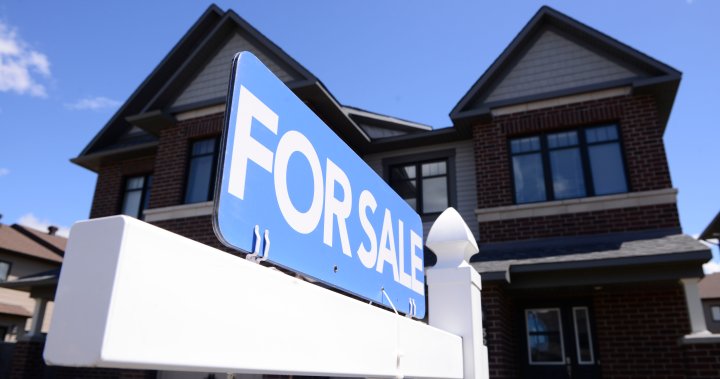This article is part of Global News’ Home School series, which provides Canadians the basics they need to know about the housing market that were not taught in school.
When multiple-offer scenarios became the norm in many Canadian housing markets during the COVID-19 pandemic, inspection conditions fell to the wayside, recalls Peter Weeks.
“If you put a clause in saying ‘subject to a home inspection,’ your offer would then just be pushed aside because there were 10 other people who didn’t have that clause and they were being looked at,” said Weeks, the president of the Canadian Association of Home and Property Inspectors (CAHPI), in an interview with Global News.
Weeks, a home inspector himself for 22 years, remembers being called after deals had closed to do inspections and tell the new owners exactly what they’d just bought.

Most were in fine condition with a few small things that would need to be addressed, but “some of them were real shockers,” he says.
The new owners of a rowhouse were surprised to learn the entire back wall of their property was “completely rotten,” and would likely require upwards of hundreds of thousands of dollars to replace.
“They had no idea,” Weeks recalls. “Had they had a home inspection, I would’ve caught it then. No question.”
Weeks and other real estate experts who spoke to Global News say a property inspection can be especially critical for first-time homebuyers who don’t know the intricacies of a home and where regular maintenance has fallen short.
For this month’s installment of Home School, here’s everything you need to know about getting a property inspection done during your homebuying journey.
What is a home inspection?
When a bid to buy a home is accepted, if it was conditional on a home inspection, the buyer will have a chance to hire an inspector to take a walk with them through the home to take a look at anything requiring maintenance or a bigger overhaul.
James Buren is a 30-year home inspector and sits on the board of directors of the Ontario Association of Home Inspectors (OAHI). He describes the role of an inspector as something of a “jack of all trades” and an independent third party who is there to identify problems, not sell the homebuyer a fix.
In this way, a home inspector is like a general physician — there to diagnose the problems in a home and send you off to a specialist, like a contractor, to remedy the issues.
For this reason, Buren also recommends homebuyers rely on more than just a handy family member or a friend who works in construction to walk them through the issues with a house.
“Even a contractor who’s very experienced wouldn’t necessarily know what home inspectors are looking at … and then be able to convey the conditions to a homebuyer in an understandable fashion, in layman’s terms,” he says.
A home inspection is primarily visual, focusing on “readily accessible” elements of a home, according to the standards and guidelines at CAHPI.
What does a home inspection cover?
A home inspection should cover the exterior of a home including the roof, as well as electrical panels and socket grounding, heating and cooling, insulation and plumbing. The home’s attic, if accessible, will also be checked out.
But the CAHPI guidelines warn that an inspection is not “technically exhaustive” and won’t necessarily uncover any concealed or latent defects in the home.
Weeks says he’s been in a few inspections where he’d love to cut a hole in the wall and delve a bit deeper to understand what’s happening in the bones of the structure a bit more.

“Well, we can’t, right? We’re guests in somebody’s home at that point, during the buying process, and we can’t do that,” he says.
Financial news and insights
delivered to your email every Saturday.
An inspector won’t move rugs or furniture or take pictures off a wall, and samples won’t be taken from the house either.
Weeks says “everybody wants to know” if asbestos is present in the home during an inspection. While he can sometimes give an educated guess based on the age and certain features of the home, he says it’s impossible to know if asbestos is present during an inspection because it’s ultimately “microscopic” and requires testing in a lab to identify.
Are home inspection conditions making a comeback?
Weeks says that, based on his own business and what he hears from other inspectors across CAHPI’s network, conditions for inspections are largely coming back after the housing market cooled from the pandemic-era frenzy.
Buren, who works primarily in the Greater Toronto Area, says he still sees sellers able to force inspection conditions off the table for high-demand properties.
Pritesh Parekh, a Toronto-based Realtor with Century 21, tells Global News that inspection conditions are viable in today’s market, but it depends on the offer presentation.
In situations where the seller has set up an offer date, the expectation is that they’ll get a bidding war going. In those cases, conditions like inspections hurt the odds of a buyer’s deal going through, Parekh says.
But in an offers-anytime scenario, conditions are more palatable, particularly when a home has been on the market for a while, he explains.

Parekh says that home inspections can be especially valuable for first-time homebuyers who are less familiar with what they should be looking for in a house’s overall condition, while repeat buyers may have more of an understanding of proper maintenance. Older homes, too, carry greater risk of improper maintenance and therefore an inspection can provide greater pierce of mind, he says.
For this reason, Parekh says he’d never discourage a client from putting in an offer condition if that’s what makes them feel most comfortable.
He might, however, shift their housing search away from the hottest properties that have been on the market for less than a week and more towards homes that are having more trouble selling, where an owner might be more willing to accept an inspection to get an offer on the table.
Putting in an offer condition also might need to be offset with a financial incentive, he notes.
How much you need to boost a price in order to get an offer with an inspection condition across the finish line varies from home to home and seller to seller, Parekh says.
But he recalls one instance where a first-time buyer client of his decided to hike their offer price by $20,000 to try to grease an offer with an inspection clause. It didn’t work, and the home sold to another offer that was $20,000 less than his client’s bid — but without an inspection.
“There is no exact number, and oftentimes the seller will forgo even $20,000 because the risk of not selling the house or getting another buyer is way more than $20,000,” he says.
Should you trust a seller’s pre-list inspection?
Parekh says that he’s been noticing more sellers getting pre-list inspections done and making them available to buyers at showings. The idea here is that if a potential buyer sees an inspection has already been done and shows no major signs of wear, they should feel confident enough to submit without an inspection clause.
Parekh compares this to condo owners pulling a property’s status certificate, which gives prospective buyers details about the condominium corporation’s financial status.
They’re more common in older properties where a buyer is most likely to ask for an inspection, he says.
But Weeks cautions that pre-list inspections should be taken with a grain of salt. He’s been sent some pre-list reports that he says are “really mediocre,” and imply that a seller got a rush job done to satisfy nervous buyers about the condition of the property.
“They’re not all bad, but again, it’s something for a buyer to be a little leery of,” he says.

Parekh says it’s common for buyers to ask him if they should trust the pre-list inspection as well. His advice is to use these documents as “directional” about where problems might lie and set expectations, but should not be taken as the “absolute, final say on the condition of the property.”
Buren says he recommends sellers get a pre-list inspection done for their own peace of mind.
Someone who has owned a home for years might not be aware of defects or decay, he says, and an inspection can point them towards areas they might need to fix to get maximum value for their property.
And if the pre-list inspection comes back with a clean bill of health on the home, Buren says a seller can be reassured that they can accept an offer with such a condition without fearing an inspector will find a flaw that jeopardizes the sale.
How do you find a good home inspector?
Some provinces, including British Columbia and Alberta, have a licensing system in place for home inspectors. Quebec is also set to adopt a licensing regime later this fall.
But in Ontario, despite a law being on the books for such a system since 2017, the program has never been put into force.
“There is no requirement for licensing or anything, and you could print a card and start doing all the inspections tomorrow. And that’s something that’s kind of scary,” Weeks says.
A real estate agent will likely have names of inspectors whom they have used in the past and whom they can offer a buyer. But there are ways to vet the qualifications of any particular inspector as well.
Associations such as CAHPI and OAHI typically come with some standards for training and mentorship that inspectors have to meet to be considered a member.
Weeks recommends buyers ask an inspector about their experience, the tools they’ll use and to sign a contract upfront spelling out exactly what service they’ll provide.
Buren says that most qualified inspectors should have a website that shows a sample report they’ll provide at the end of the process, ideally with pictures that show a homeowner exactly what’s being talked about amid the technical breakdowns.
How much do home inspectors cost?
Both Buren and Weeks say another red flag for a bad inspector is if they’re not carrying errors and omissions insurance, or liability coverage.
Buren says that the premiums for this insurance count in the thousands of dollars each year. A worthwhile inspector, therefore, will have to charge a fair price to offset these costs, and to show they’re not rushing the report or trying to squeeze in too many inspections in a day.
“My belief is that price should indicate a professional level of performance,” he says.
At minimum, an inspection fee should be around $550 to $600, Buren says, with anything significantly lower warranting skepticism.

A home inspector should also be able to break down how their fee is calculated, he says. In his case, he has different charges based on the size of the property and the age, whether it’s 15, 50 or more than 100 years old.
When a buyer is going through a home, he also recommends they don’t bring family along or anyone who’s keen to see the property but could be a distraction. An inspection is a chance for a buyer not only to understand that home, but future properties they might be looking at as well.
“You’re going to be able to look at homes more intelligently yourself,” Buren says.





